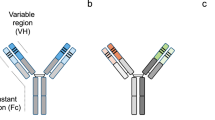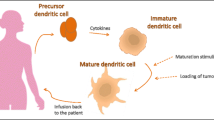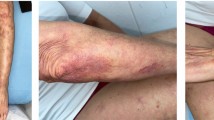Abstract
Malignant melanoma is an aggressive skin cancer with no effective therapies currently approved for advanced disease. In the case presented, a 55-year-old female patient diagnosed with widespread disease from amelanotic desmoplastic melanoma was treated with 10 mg/kg ipilimumab as part of a phase II clinical trial (CA184-008). Prior to ipilimumab, three chemotherapeutic regimens had failed. Ipilimumab acts as a T-cell potentiator via blockade of cytotoxic T-lymphocyte antigen-4, a negative regulator of T-cell activation. Response to ipilimumab treatment was rapid, with a substantial drop in tumor volume within 12 weeks of treatment initiation. Based on the appearance of a new subcutaneous lesion, reinduction with ipilimumab was performed at Week 30. Following reinduction, the appearance of another small new lesion made the patient ineligible, as per protocol, for further dosing despite stabilization of her remaining lesions. Ipilimumab-associated immune-related adverse events were manageable with the use of treatment guidelines. It is of remarkable immunotherapeutic importance that no new lesions emerged and gradual tumor regression is still ongoing more than 2 years following the last dose of ipilimumab, despite daily administration of systemic corticosteroids to manage drug-induced AEs. The ongoing clinical response is maintained without any further antineoplastic treatment.


Similar content being viewed by others
Abbreviations
- β-hCG:
-
β-subunit of human chorionic gonadotropin
- CTLA-4:
-
Cytotoxic T-lymphocyte antigen-4
- ECOG-PS:
-
Eastern Cooperative Oncology Group Performance Status
- irAE:
-
Immune-related adverse event
- OS:
-
Overall survival
- PD:
-
Progressive disease
- SPD:
-
Sum of the perpendicular diameters of tumor
- TSH:
-
Thyroid-stimulating hormone
- ULN:
-
Upper limit of normal
- WHO:
-
World Health Organization
References
O’Day S, Boasberg P. Management of metastatic melanoma 2005. Surg Oncol Clin N Am. 2006;15:419–37.
Hodi FS, O’Day SJ, McDermott DF, Weber RW, Sosman JA, Haanen JB, Gonzalez R, Robert C, Schadendorf D, Hassel JC, Akerley W, van den Eertwegh AJ, Lutzky J, Lorigan P, Vaubel JM, Linette GP, Hogg D, Ottensmeier CH, Lebbé C, Peschel C, Quirt I, Clark JI, Wolchok JD, Weber JS, Tian J, Yellin MJ, Nichol GM, Hoos A, Urba WJ. Improved survival with ipilimumab in patients with metastatic melanoma. N Engl J Med. 2010 Jun 14 [Epub ahead of print].
Kirkwood JM, Tarhini AA, Panelli MC, Moschos SJ, Zarour HM, Butterfield LH, Gogas HJ. Next generation of immunotherapy for melanoma. J Clin Oncol. 2008;26:3445–55.
Agarwala SS. Current systemic therapy for metastatic melanoma. Expert Rev Anticancer Ther. 2009;9:587–95.
Fong L, Small EJ. Anti-cytotoxic T-lymphocyte antigen-4 antibody: the first in an emerging class of immunomodulatory antibodies for cancer treatment. J Clin Oncol. 2008;26:5275–83.
Wolchok JD, Neyns B, Linette G, Negrier S, Lutzky J, Thomas L, Waterfield W, Schadendorf D, Smylie M, Guthrie T Jr, Grob JJ, Chesney J, Chin K, Chen K, Hoos A, O’Day SJ, Lebbé C. Ipilimumab monotherapy in patients with pretreated advanced melanoma: a randomised, double-blind, multicentre, phase 2, dose-ranging study. Lancet Oncol. 2010;11:155–64.
Weber J, Thompson JA, Hamid O, Minor D, Amin A, Ron I, Ridolfi R, Assi H, Maraveyas A, Berman D, Siegel J, O’Day SJ. A randomized, double-blind, placebo-controlled, phase II study comparing the tolerability and efficacy of ipilimumab administered with or without prophylactic budesonide in patients with unresectable stage III or IV melanoma. Clin Cancer Res. 2009;15:5591–8.
O’Day SJ, Maio M, Chiarion-Sileni V, Gajewski TF, Pehamberger H, Bondarenko IN, Queirolo P, Lundgren L, Mikhailov S, Roman L, Verschraegen C, Humphrey R, Ibrahim R, de Pril V, Hoos A, Wolchok JD. Efficacy and safety of ipilimumab monotherapy in patients with pretreated advanced melanoma: a multicenter single-arm phase II study. Ann Oncol. 2010 Feb 10. [Epub ahead of print].
O’Day S, Weber J, Lebbe C, Maio M, Pehamberger H, Harmankaya K, Siegel K, Hoos A, Humphrey R, Wolchok J. Effect of ipilimumab treatment on 18-month survival: update of patients (pts) with advanced melanoma treated with 10 mg/kg ipilimumab in three phase II clinical trials. J Clin Oncol. 2009;27(Suppl. 15s); abstract 9033.
Binder M, Forstinger C, Koelbl H, Bieglmayer C. A 30-year-old woman with melanoma metastases and a positive pregnancy test. J Am Acad Dermatol. 1999;41:802–3.
Stenman UH, Alfthan H, Hotakainen K. Human chorionic gonadotropin in cancer. Clin Biochem. 2004;37:549–61.
Doi F, Dorcas DJ, Chi DDJ, Charuworn BB, Conrad AJ, Russell J, Morton DL, Hoon DSB. Detection of beta-human chorionic gonadotropin mRNA as a marker for cutaneous malignant melanoma. Int J Cancer. 1996;65:454–9.
Acevedo HF, Tong JY, Hartsock RJ. Human chorionic gonadotropin-beta subunit gene expression in cultured human fetal and cancer cells of different types and origins. Cancer. 1995;76:1467–75.
Regelson W. Have we found the “definitive cancer biomarker”? The diagnostic and therapeutic implications of human chorionic gonadotropin-beta expression as a key to malignancy. Cancer. 1995;76:1299–301.
Wolchok JD, Hoos A, O’Day S, Weber JS, Hamid O, Lebbé C, Maio M, Binder M, Bohnsack O, Nichol G, Humphrey R, Hodi FS. Guidelines for the evaluation of immune therapy activity in solid tumors: immune-related response criteria. Clin Cancer Res. 2009;5:7412–20.
Weber JS, O’Day S, Urba W, Powderly J, Nichol G, Yellin M, Snively J, Hersh E. Phase I/II study of ipilimumab for patients with metastatic melanoma. J Clin Oncol. 2008;26:5950–6.
Weber J. Review: anti-CTLA-4 antibody ipilimumab: case studies of clinical response and immune-related adverse events. Oncologist. 2007;12:864–72.
Blansfield JA, Beck KE, Tran K, Yang JC, Hughes MS, Kammula US, Royal RE, Topalian SL, Haworth LR, Levy C, Rosenberg SA, Sherry RM. Cytotoxic T-lymphocyte associated antigen-4 blockage can induce autoimmune hypophysitis in patients with metastatic melanoma and renal cancer. J Immunother. 2005;28:593–8.
Chin K, Ibrahim R, Berman D, Yellin M, Lowy I, Lin R, Hoos A. Treatment guidelines for the management of immune-related adverse events in patients treated with ipilimumab, an anti-CTLA-4 therapy. Ann Oncol. 2008;19(Suppl. 8): 787.
Lin R, Yellin MJ, Lowy I, Safferman A, Chin K, Ibrahim R. An analysis of the effectiveness of specific guidelines for the management of ipilimumab-mediated diarrhea/colitis: prevention of gastrointestinal perforation and/or colectomy. J Clin Oncol. 2008;26(Suppl.):abstract 9063.
Amin A, DePril V, Hamid O, Wolchok J, Maio M, Neyns B, Chin K, Ibrahim R, Hoos A, O’Day S. Evaluation of the effect of systemic corticosteroids for the treatment of immune-related adverse events (irAEs) on the development or maintenance of ipilimumab clinical activity. J Clin Oncol. 2009;27:15s, suppl; abstr 9037.
Acknowledgments
Editorial and writing assistance provided by StemScientific, funded by Bristol-Myers Squibb Company.
Acknowledgment of support
Dr. Harmankaya did not receive any research support for these studies.
Disclosure
KH and CE served as study coordinators for the studies described in this manuscript. HP and MB were principal investigators for the CA184-008 and CA184-025 studies, respectively. CK has nothing to disclose. RI and AH are employees of Bristol-Myers Squibb Company.
Author information
Authors and Affiliations
Corresponding author
Rights and permissions
About this article
Cite this article
Harmankaya, K., Erasim, C., Koelblinger, C. et al. Continuous systemic corticosteroids do not affect the ongoing regression of metastatic melanoma for more than two years following ipilimumab therapy. Med Oncol 28, 1140–1144 (2011). https://doi.org/10.1007/s12032-010-9606-0
Received:
Accepted:
Published:
Issue Date:
DOI: https://doi.org/10.1007/s12032-010-9606-0




